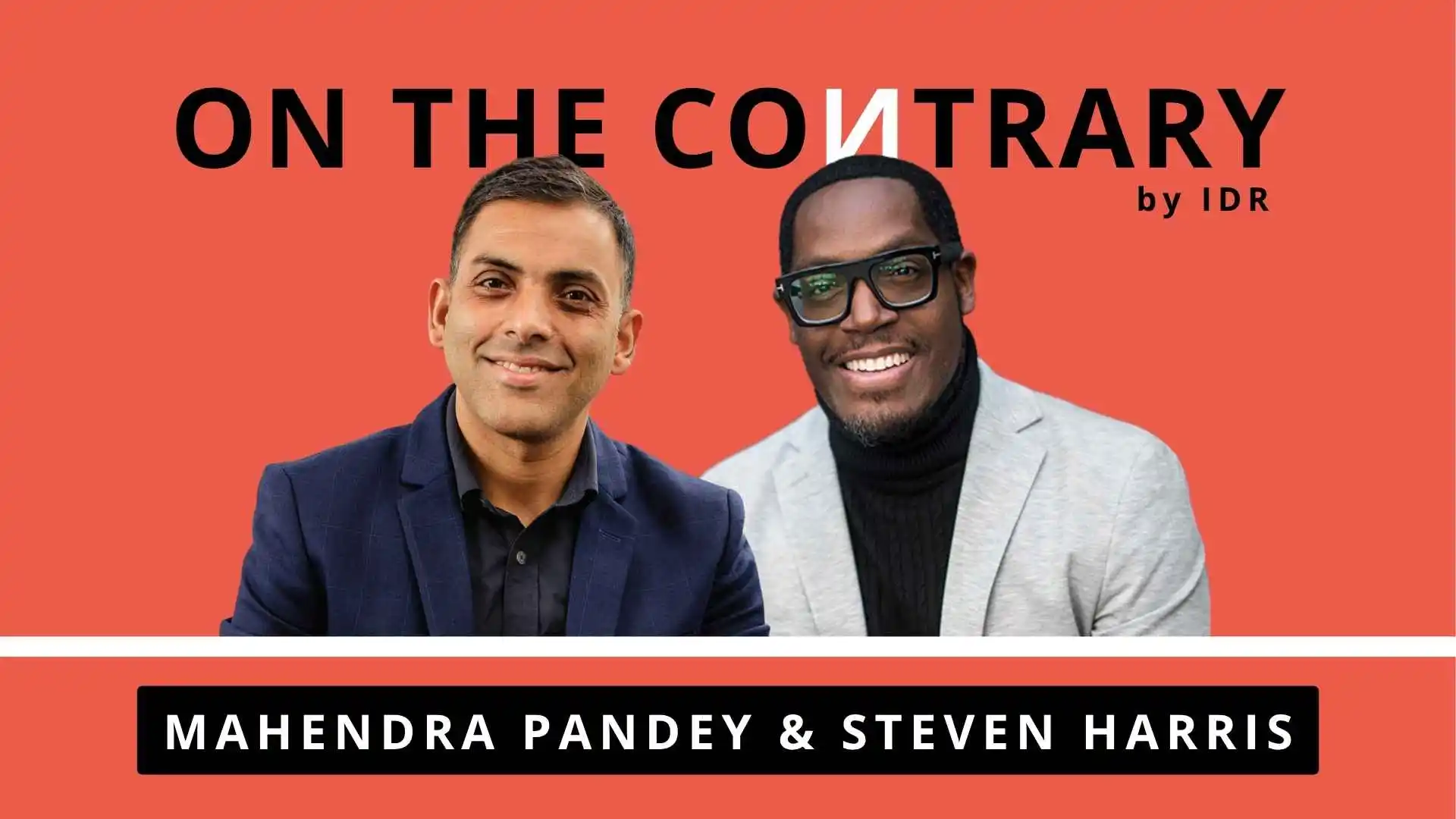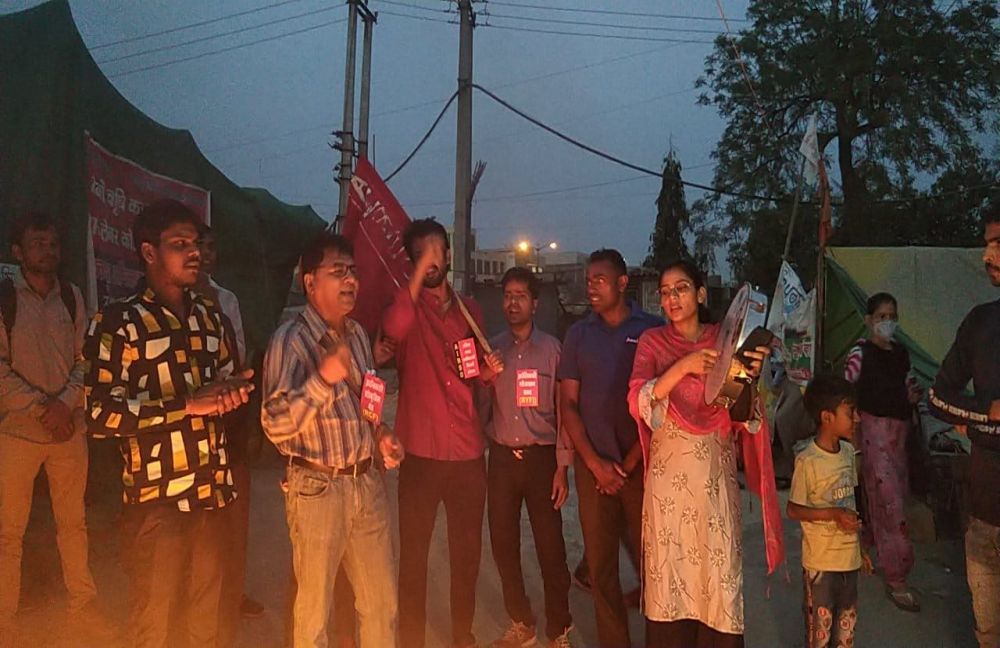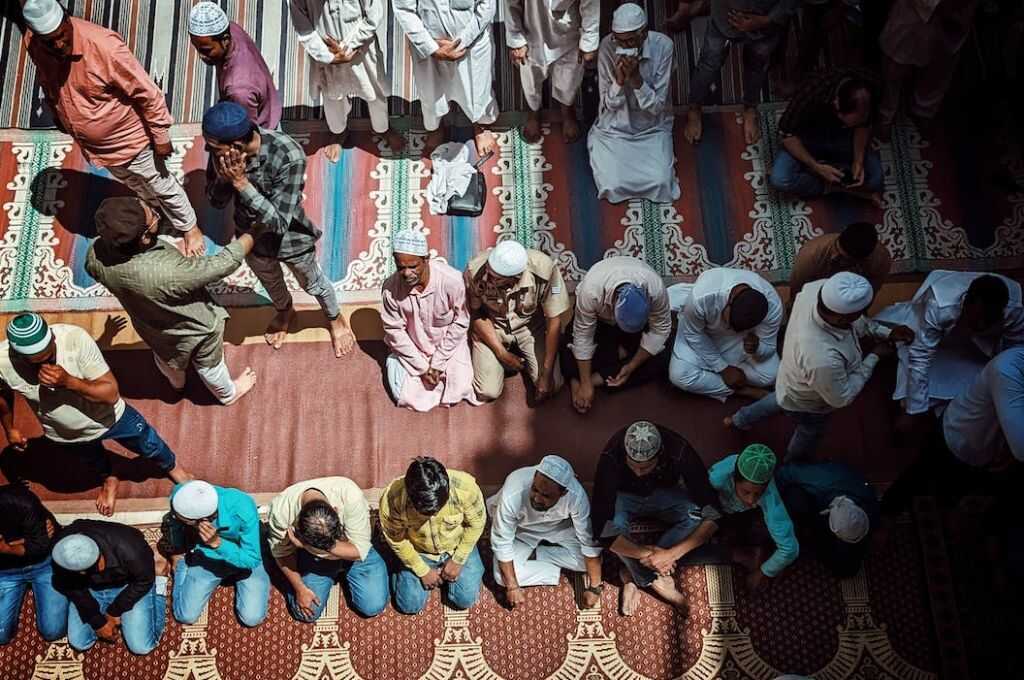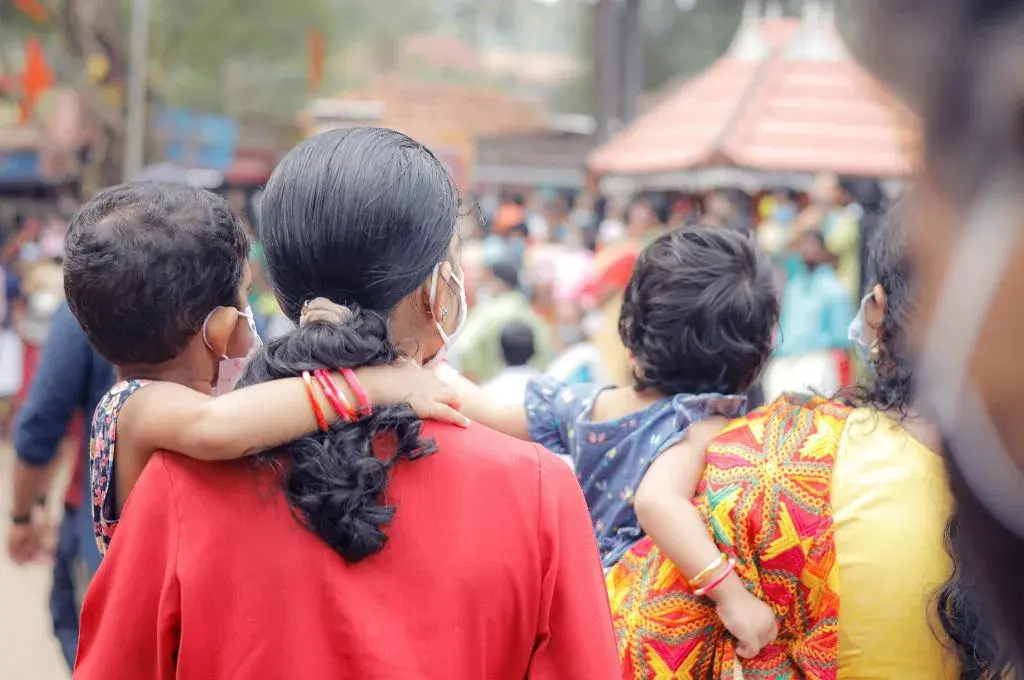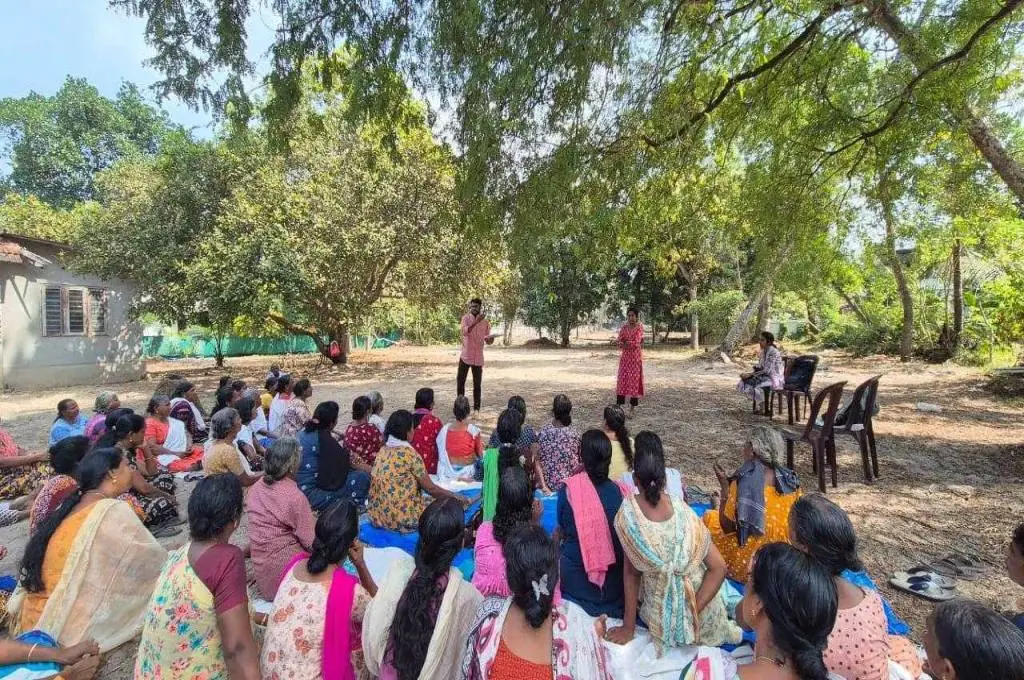Edited transcript of the episode:
00.50
Devanshi: We’ve long been told that working on justice demands urgency, sacrifice, and relentless selflessness. Activism is often portrayed as a race against time, a call to show up no matter the cost. But this mindset can take a heavy toll, burning out the very people who keep movements alive. In this episode, we sit down with Kumi Naidoo and Louisa Zondo to rethink activism.

How do we sustain resistance when exhaustion is constant? What does well-being mean for those on the frontlines of change?
Both Kumi and Louisa have spent their lives pushing against power while also trying to redefine it. Kumi is a human rights and environmental justice activist, whose journey began as a teenager during the Anti-Apartheid Movement in South Africa. He has led major global organisations like Amnesty International and Greenpeace. Kumi has also authored a deeply personal memoir, Letters to My Mother: The Making of a Troublemaker, tracing his journey.
Louisa is a lawyer and a social activist with a long history of leadership in South Africa’s justice landscape. She served as a deputy executive director of the Constitutional Assembly during the country’s transition from apartheid and became the chief executive of the South African Human Rights Commission. Today, she is the co-founder of the Riky Rick Foundation for the Promotion of Artivism, established in the memory of her late son. In 2023, she published Dearest MaRiky: A Mother’s Journey Through Grief, Trauma and Healing, a memoir reflecting on her life with her son.
Together, in this episode, we’re going to explore new ways to build movements that last, not just in years, but also in generations.
I’ll start with my first question. Both of you have spent decades fighting for justice across climate, democracy, and human rights. What has that taught you about the human limits of urgency and always feeling the need to respond immediately?

02:54
Kumi: I think that for the both of us who grew up in a brutal system of apartheid exploitation, we from a young age were thrown into that struggle, and everything appeared to be so urgent and was urgent. People, friends of ours being killed around us; people being thrown in prison; people disappearing; and so on. And, in my case, also just as I was getting involved at the age of 15, a few weeks before I would become actively involved, my mom [died by] suicide at the age of 38. And I was 15.
And, you know, during that time, a lot of people gave me various [kinds of] advice…well intentioned…and so on. And [they] were saying things like, “God picks his favourite flower first,” “She’s in a better place,” “She’s not in pain,” and so on.
And in the midst of all of what people were telling me, one of my father’s friends who was an activist said, “My boy, I don’t know how you recover from something like this. But one thing I want to tell you is that irrespective of how bad you are feeling right now or how much pain you are feeling, there are people in our country, on our continent, and [in] the rest of the world who are suffering so much more. So, if you want to do something good with your life and to address the pain you’re in, live with purpose, live and work for the dignity of others.”
And that was something that shaped my life, that sort of logic, from the age of 15. But he never said, “Don’t take care of your healing,” and so on. He said, “Live with purpose.” And so, I just want to say that one of my lessons is that living with purpose and taking care of yourself physically, emotionally, and mentally should not be put in contradiction with one another. One of the things that Louisa and I like to say in conversations like this around healing and care is that we are definitely not poster kids for this thing.
Our lives are not the ones to look at because we made the mistake of not finding the right balance when various traumas came in our direction. We tended to just double down and work even harder, and never really took care of the personal traumas that were happening.
Remind yourself every day that the struggle for justice is a marathon and not a sprint.
And I’ve now come to realise that I’m speaking about [this], the reason I agreed to do a podcast like this, is to say, particularly to younger activists: Don’t follow my lead on this one. I pushed my body to a point of multiple burnouts, and so on. Living with balance and living with care is important. And, most importantly, remind yourself every day that the struggle for justice is a marathon and not a sprint. The biggest sacrifice we can make is making sure that we are there for the long haul, ensuring that we are physically and mentally healthy, that we can be the best versions of ourselves. And neglecting that is neglecting your responsibility as an activist.
06:23
Louisa: I would add to what Kumi has said by just saying, of course, living in urgency is unsustainable. All of science tells us this. We know how exhausting it is; we know that the parts of the brain that we are using when we are in this mode of urgency, the mode of survival, those cannot be used for too long. They are simply meant for us to push through the danger and survive. And then we bring on the more balancing, the more connecting parts of the brain, which enable us to see where the thriving comes from, where the love comes from, where the growth, where the connection comes from.
So, the lessons that we must keep alive in ourselves as we continue in the many, many struggles that still need to be attended to in life are exactly that. That there is opportunity and capacity to see differently, and therefore to step more into the parts of our brains, the parts of our bodies that enable us to grow, to be creative, to attend to connection, and to build from that.
07:56
Devanshi: But activism, unfortunately, doesn’t centre well-being, right? The way it functions, by design, isn’t really sustainable. At the Hearth Summit in Slovenia, where we first met and where you both were speaking, Kumi, you [talked about] a conversation with your therapist who told you that the world was not going to end if not for your activism. In that light, how do you both think about what well-being and care can look like for activists?
08:21
Kumi: It has had enormous consequences, not being able to find the right balance, right? And partly, we also should be very honest about this conversation on the difference within the broad activist movement. Because we talk about the Global South and the Global North these days, and the Global South constitutes 88 percent of the world’s population. And I am not sure whether addressing well-being in the Global North, where the domination, colonial history, slavery, nuclear weapons, and all of those things come from, is going to be the same as addressing it for folks in the Global South. So, if you are a rural activist in the Transkei region where Nelson Mandela comes from, you’ve got Shell, an Australian mining company, and others coming and killing, in collusion with agents. Obviously, nobody has been charged yet, but people who got killed were standing up to Shell and other companies. So, when you’re dealing with a life-and-death situation like that, it’s hard sometimes, when people are getting killed around you and where people are being thrown in prison and so on. I just want to concede that not that many people in the Global North, for example, face that reality.
One of the things I worry about in the whole global sort of care and well-being space is that we must respect, more than we’ve done in the past, indigenous wisdom, plant medicine, spirituality of a different kind, and so on. And we have to also recognise that we should be blunt about it, that there’s an emerging industry around well-being that exists in the world, which actually sometimes mimics some of the very problems with the state of the economy and how those things are set up. So, we need to go into this with our eyes open. And I think we should also go into it without seeking to get one blueprint that is applicable to everybody, everywhere, in exactly the same way.
10:51
Louisa: Yeah, and I’d love to agree with everything that Kumi has said and just add that, even at a personal level, take for example in the late ‘80s [when we] were, on the cusp of the apartheid regime being overthrown, violence was enormously heightened. In the township that I lived in, every day was a constant battle in the late ‘80s and the early ‘90s. Every day was a constant battle. Young people would have to leave their homes for protection and to form, sort of, defense units and camp in spaces in the wilderness.
What was happening though is that when I, on occasion, was travelling with a filming crew that was recording what was happening, I came to a place in the morning that we had been at [the previous] evening [recording] people’s stories about what was happening. And in the morning, there had been an attack. And when I looked at the space, I saw in some, in the middle of the structure that had been bent down, the embers were quite alive. On a closer look, you could see a structure, and I apologise for being gross, but I think this makes the point, you could see the structure of a human body. I would have imagined that a properly regulated person’s response to that would have been a visceral bodily reaction, vomiting or whatever else. But for me, it was looking. So, what is very important to attend to is that, personally, we are fundamentally changed by the traumas of the different types of struggles that we go through.
If you were to take me in that instance and ask what heals me, it certainly would not be me sitting down in therapy with a psychotherapist trained in [a] Western mode. It probably would be me sitting in [a] circle with the women who experienced the attack, going through rituals with them for the cleansing and the strengthening of our souls, our spirit, [and] our understanding of where we stand in life as a result of such an experience.
This is just to emphasise the expansiveness of the idea of care, and saying that when we’re talking [about] care, we’re not talking [about] modes that have been made popular, that have been commercialised, that have received resonance in many parts of the world. But we are including fundamentally what Kumi speaks about—the structures, the systems, [and] the wisdoms that many in the global majority hold, but [that] are not centred.
14:23
Kumi: Devanshi, if I can just come back with another point, and it is [that] we should bring a class dimension to this question as well, right? And this is the uncomfortable thing to say. If you look at the class backgrounds of the leadership in the nonprofit sector, the various movements, and so on, it’s often people like ourselves, who have had the benefit of a university education, who generally probably come from progressive middle-class homes, right? Not always.
And actually within our own societies, if you leave the north–south dimension aside for the moment and just look at societies in the Global South or in the Global North, and you look at the profile of [those] who are social change agents, what class position they occupy and all of that, also raises a troubling question about how we can deploy scarce resources for well-being and care investments in a way that we don’t privilege the middle-class leadership profile of many civil society movements, both in the Global North and the Global South, because then what you do is, you actually create an elite kind of architecture of support that cannot be replicated for the grassroots activists who are actually putting their lives at much higher levels of risk on a day-to-day basis, who live in frontline communities, whether they’re fighting fossil fuel projects or whether they’re pushing back on fascism and so on.
So, I think if this work is going to have integrity, and if we’re going to build, moving forward, the best kind of support from a care and well-being point of view for people involved in seeking justice, we must also talk about the contradictions that exist within ourselves and don’t think, again, [about] catering to the most elite among us and their needs. Because their voices will be the loudest, always.
16:39
Devanshi: I have to ask, how do we do that? Because a lot of what you said, we see that happening in India as well. So often resources and opportunities get concentrated in big cities, with many social impact organisations clustered in just a few regions. Their leadership often has the advantage of having attended certain universities, building strong connections, and speaking the right language to navigate funders’ asks and needs.
And when a funder from the Global North brings their idea of development and care, it can feel like we’re asked to fit into this model. That might mean, for example, being told to take care of your mental health in ways that don’t reflect local realities. I’m in therapy myself, so I’m not against it, but I wonder, when we talk about care, collective healing, and local context, what does it look like to truly build from the margins to the centre instead of the other way around?
17:30
Louisa: For me, it starts with recognising that, structurally, we all are caught up in these systems that are designed to perpetuate the practices [and] the outcomes that we have identified as flawed and tyrannical. So, if we start from the point of recognising that fundamentally we are caught up, and everybody is complicit in it, in systems that are designed to reinvent and advance themselves, we probably can realise then that the starting point is to work towards not achieving the outcomes of the system, but to fundamentally shift our gaze and start off with engaging with the people with whom we are engaging about change.
If it’s the women in the rural space that we are going into, we start there with understanding what life means for them, what they hold sacred, what they hold as fundamentally identifying with them, identifying with the core of their humanity. Understanding that and understanding what they regard as things that they have lost in this life, things that they still hold in huge reverence and they want to see come back and get centred and valued in their lives. And that’s a huge exercise.
19:26
Devanshi: Thanks, Louisa. Kumi?
19:28
Kumi: One is, don’t pretend that these contradictions don’t exist. In most of our movements, it’s very difficult to actually talk about [this]; we want to pretend that we are all equal. If we sit in a global meeting, even though I have the indignity of having to apply for a visa for almost everywhere I go, and say at Greenpeace and Amnesty, I’m sitting with majority colleagues who carry passports of the Global North, they don’t really have a sense of what that actually means. Obviously, it’s not their fault. They didn’t come up with the visa policies, but to be honest, they don’t speak out in criticising it, hardly ever. And that should be noted. But the problem is that, for me to make a trip to a country in an emergency, [it] can’t often happen because I need to apply for visas. [For] our colleagues in the North, what happens is that they can do it.
Therefore then, our institutions continue to be as structurally racist as they are because of some of those things. So, acknowledging the contradiction is really important. The second thing is to really dig deep and listen and learn. It’s not as if a rural development campaigner doesn’t have well-being coping skills, and healing skills, and so on. They just have different skills, different ways of doing it, and they might need different support. Thirdly, I also think there is sufficient evidence right now that psychedelic science offers some important contributions to especially [treat] PTSD. When we look at, for example, our MDMA-assisted therapy, it is helping veterans from wars cope with PTSD and [is] having a significant success rate. We would be open to all of those.
And then also understand [that] the contradiction we struggle with is that the costs of accessing all these therapies, whether [it] be conventional talk therapy, as well as the indigenous therapies and so on, they cannot be accessed on a mass scale. It’s just a very small number of us. To be blunt about it, Louisa and I would not have been able to afford many of those things if friends didn’t step forward and force us to do it and say, “We’re paying for you and you’re going to go for this or that.” So, I think part of what we need to do is have a real, open conversation about affordability of the services that are available. And if it doesn’t have the potential to be, to use a very South African word that is not a real word, [but] if it cannot be ‘massified’, reach large numbers of people, then we should be asking what it would take to make this more accessible, so that it’s not only the most elite of us within our movements who are able to access it.
22:40
Devanshi: Thank you. I’d like to explore another aspect of your journeys as activists, and that is leadership. You’ve both been recognised as leaders with influence in communities and within organisations. What have you unlearned about power along the way? How do you see it differently now than you once did?
22:58
Louisa: The unlearning I had to go through, and I continue to go through, is that we are not frameworks. We are not plans. Life is not what is constructed in ideas that are recorded in some place. Life is the unfolding of everything, including the senses that we get, sometimes we don’t know from where. And there’s space in organisations, in movements, there is space for that to be brought in, to be valued, and to guide our creativity. So, in a few words, describing what my unlearning is about, it’s about understanding where the wisdom comes from, and sensing even from the unspoken, untouched parts and trusting that.
24:00
Kumi: I would add to that to say that I’ve [been] in a process of unlearning a lot of things. I come [in] to this conversation with a major sort of limitation and that is that I’m a man. And I say that quite strongly because if you look at all the major challenges that we face in the world, most of them were created by the logic of patriarchy and male domination. So, one of the things I’m struggling with is how not to just take the power that comes from a geographical accident based on how gender roles are assigned. So, being mindful of that is something really important.
Then the second unlearning is not to be apologetic about saying [that] I’m really exhausted and I need to stop for a couple of days, otherwise I’m going to burn out. If I were to [talk about] the kinds of things I’ve tried to do…not as well as I should…and therefore I say I’m a work in progress in this journey. So, for example, one of the things I try to do now is if somebody wants to come and have a meeting, I check, is it a place where I can actually do it as a walking meeting? It might sound like a very small thing, but I know that for my health, for my physical health, I need to be more active than my schedule allows me to.
Then the other thing I’m trying to unlearn is sleep. I think when I was a teenager, I read somewhere that Mahatma Gandhi got by on four hours of sleep a day. And I sort of thought, okay, let me train myself to have four hours. So, for the majority of my life I have tried [that]. Especially when I’m in the midst of a campaign or work, if I get four hours [of sleep], I’m like, “Hey, I got four hours, great.” And we know that sleep deficit and accumulated sleep deficit can [basically] kill you. I’m trying to sleep more, [but I’m] not as successful [at it] as I’d like to be.
So, I’m trying to unlearn some patterns of bad behaviour, even in terms of what I eat, and seeing exercise, for example, physical exercise, not as an optional thing but as a life-saving investment, because one’s physical and mental health is so related to ensuring that you exercise and you’re doing things that are keeping you healthy.
26:47
Louisa: But as well, Devanshi, if I could just add that the unlearning process is made quite challenging by the reality that even in our own institutions, in our own organisations, the movements that we are part of, and supporting, and maybe even creating, we do tend to bring the energies and ways of seeing that are tied in with what we say we want to change. We do reproduce those violent ways of being in what we are building anew. So, the valuing of hard work becomes this expectation that everybody must not sleep. Everybody must live, drink, eat their organisation, and its plans, and the action in it. And somehow in language and words, we say rest is important, but never in the actual gaze that we give towards each other and to the work.
27:56
Devanshi: This makes me think about the next generation of organisers and activists. If you were speaking to someone in their early 20s, someone who’s feeling disillusioned or hopeless about the state of the world, what’s the one thing that you would say to them?
28:10
Kumi: My one thing would be, don’t think you can deal with the challenge of a world slipping away from us on your own. Build circles of support around you. You’re not the only one, and don’t imagine you’re the only one, going through that sentiment. Climate change, for me, constitutes the most horrendously massive intergenerational betrayal. Because the people that are making policies right now are not the ones, you know, those who are clinging onto fossil fuels and delaying the transition away from fossil fuels and so on, are not going to pay the consequences. Their children and grandchildren are going to pay the consequences.
Activism can be what actually gives our life the kind of meaning, why we will want to wake up.
So, to young people, I say, don’t give the benefit [to] those who have been driving destruction, exploitation, and greed, the benefit of knowing that they have deprived you of your mental health. If you don’t want to give them that benefit, then you have to make some investments in building a network of support around you. Not only, by the way, with people in the community of activism that you might be part of. Don’t underestimate how important it is to have an aunt, an uncle, a cousin, a childhood friend who’s not in that same world as you.
Louisa doesn’t like me to use this phrase, but we also have to be saying, activism can be fun. Activism can be sexy. Activism can be what actually gives our life the kind of meaning, why we will want to wake up. And if people are doing things that they enjoy doing, then that involvement is likely to be significantly more sustainable than if they are doing things that they [simply] can do.
I mean, I get asked to do tons of things which I can do because I’ve learned over several decades. But I hate doing a lot of those things. And I am also trying now to do things that give me more joy. Because if I’m going to be energised in my participation, like anybody else, I need to know that the time spent on what I’m doing is not only fighting for justice on a long-term basis, but on a short-term basis, it’s giving me the strength and fortitude that I need to be able to just live every 24 hours in a purposeful, balanced, happy way. And I would just stress again, for me that’s still a learning journey and I’m not there yet.
30:59
Louisa: In addition to all those important things, about not being alone and realising that there is a lot that is involved in life, I would ask such a young person about dreaming, what they dream of.
What are your dreams in regard to just taking care of the self, replenishing [your]self. What are your dreams in regard to just revitalisation and playing? Where do you go? What do you do? Spirituality. Where do you belong? Who are you? What’s the true being that you are? Who’s your true self? So, when we open up the opportunity for people who basically have not had opportunity to really entangle themselves with these things and see that they matter, just bring ourselves back to the dream. Our dreams are our gifts, and we can reclaim them. And therefore, when we see our dreams, we probably can start asking for support, which leads us towards the realisation of some of those beautiful dreams.
32:25
Devanshi: Thank you both. This has been such an insightful conversation, and I’m really grateful for the reflections and perspectives that you’ve shared from your journeys. Before we wrap up, I’d love to leave a little space for anything you didn’t get a chance to say but would like to add.
32:40
Kumi: Perhaps, to try and put a frame in conclusion of how we can make this not an onerous piece of activity, but something that we want to embrace. And that is to psychologically budget for things going wrong in the coming years ahead of us. Because we know we’re going to see intensification in terms of climate, extreme climate/weather events that [are] going to take lives, and so on, until we hopefully get a fix on reversing the path that we’re on. What I mean by that is tell yourself, “Hey, in the next 12 months, we’re probably going to see 12 extreme weather events minimum, probably more like 100. I wonder what’s going to hit my country. Hopefully it’s not more than three.” But at least budget for three extreme weather events, so when it comes, you’re not caught flat-footed. You know what I mean?
And then also just not in terms of climate, but looking at the rise of fascism that we are seeing around the world. You know that we have to push back on it, but also know that the power dynamics right now are such that there are some very powerful fascist governments in power right now, fascist-leaning if you want to be kind. And when they do the things they do, when they crack down on media, when they detain people, when they restrict the freedom of assembly, association, and expression, as we’re seeing even governments like the UK doing, putting climate activists in prison for five–six-year sentences and all of that, budget for those things in your mind. Tell yourself the reality of the space we’re operating in. Some really troubling things that we thought we had dealt with a couple of decades ago are coming back. So that when it comes, you are as best prepared to deal with it than if you imagine that it’s not going to be coming in your direction. Thanks.
34:48
Louisa: And the last part for me is just about this awareness we need to carry. Attending to our mental health and our well-being is not weakness, where we are required to be strong and resilient for struggles that really matter. No, that is the core of attending, to shaping and reshaping the world so that it is a place; even though we might be perishing soon, but it’s a place where we find belonging, we find love, we find joy, and we are set.
What a powerful assertion it is to assert that we are part of each other. We belong; we are connected. So, for me, mental health and well-being is at the centre of recognising that there is a lot that we need to attend to, and we can only do so when we carry the ability to cope, because our minds are supported, and our well-being is attended to in the ways that make sense to us.
—
Read more
- Activism in the anthropocene: Organizing cultures of resilience
- Global mental health from the margins
- Battling burnout: Towards a regenerative activist culture
- The powerful history of self-care and how to honor it today
- Healing is liberation: Centralising decolonial and collective healing praxis in feminist organising
- Preparing for a marathon, not a sprint
- Racism, whiteness, and burnout in antiracism movements

